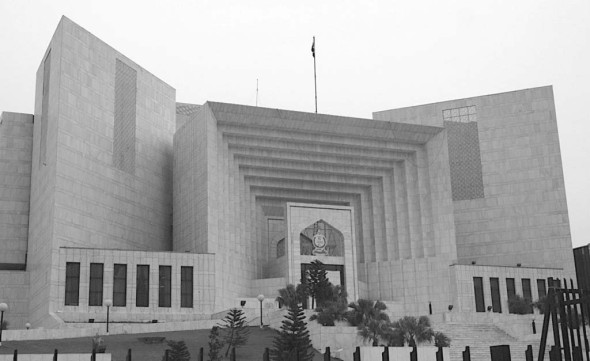It is perhaps little known outside of legal circles, that the Supreme Court of Pakistan has recently initiated a programme for translating its judgments into Urdu and placing them on its website for easy public access.
Furthermore, it is now not surprising to find references to Hazrat Ali, Hafiz and Sheikh Saadi in judgements of the superior judiciary. The synchronicity between these developments suggests that rather than being isolated events, these may be aspects of a broader move on the part of the judiciary to reinvent, not only itself, but also perhaps the very institution of law in Pakistan.
The clue as to why the judiciary may feel the need to undertake these measures lies in the history of our legal institution. The manner in which our courts and lawyers function today is a legacy of the Raj. The British legal system was introduced in the subcontinent in 1672, when the first British court was set up in Bombay, and was consolidated in 1774, with the establishment of the Supreme Court of Judicature at Calcutta.
These courts brought along with them not only British styled laws and lawyers but also an attendant legal culture which gradually came to dominate all aspects of life in the subcontinent except perhaps those regulated directly by the religion of the subjects (eg marriage).
Transplanting a foreign legal system into the complex and diverse Indian landscape had two distinct yet opposite effects: It forced an entire population to submit to a legal system, which, despite occasional attempts at cultural sensitivity, remained at odds with its history, culture and language and therefore arguably with its psyche, whilst at the same time, it homogenised and equalised a deeply fragmented society.
It was perhaps for its unifying effect inasmuch as it was for ease of transition and maintaining continuity, that at the time of Independence, both India and Pakistan retained British laws rather than adopting those that may have more accurately reflected their pre-colonial heritage.
From then onwards, other than minor adjustments necessitated by circumstances, our laws are largely either those that we inherited from the British or acquired at the dictates of Western-dominated international institutions; our legal education focuses entirely on these laws and foreign qualifications — especially English — remain prestigious; the English language, no matter how poorly spoken, is the preferred language in the courts and, despite our climate, dark Western suits are our uniform.
None of these appearances of assimilation, however, detract from the fact that the foundations upon which our legal institution is constructed are foreign and, therefore, perhaps inherently alien to us.
Given the context, it is likely that the superior judiciary’s present efforts are merely attempts towards bridging this sense of inherent alienation. It is not, however, immediately clear whether these are either meaningful or sufficient.
The translation of judgements makes one wonder why the judgements have to be rendered in English in the first place when English is not the native language of the judges, lawyers or litigants. If the reason for that is the British foundations of our legal system, then one wonders how a mere translation that leaves these foundations intact, is capable of finding resonance with the local population.
The answer to this perhaps lies in the superior judiciary’s increasing trend of citing in their judgements, teachings of scholars from our Muslim past. Leaving aside the choice of scholars cited (who being non-native and exclusively Muslim, perhaps still leave a gap between the system and the populace) this effort seems unlikely to penetrate the foundations of the system unless the teachings cited are also included in the curriculum of law colleges in Pakistan and therefore made an integral part of the analytical and jurisprudential tradition in the country.
Failure to do so will only serve to drive a wedge in the communication between the bar and the bench and merely displace twice-over an already displaced legal psyche.
If, as the above discussion suggests, the superior judiciary’s efforts are not geared towards meaningfully indigenisng the Pakistani legal institution then what, if anything, are they achieving?
An explanation for this may be found in the writings of Dr Frederick Schauer, professor of law at the Kennedy School of Government and later University of Virginia.
According to him, law, more than any other institution, is believed to be a symbol of national sovereignty. Nations, he says, especially new and transforming nations, may believe that “indigenous lawmaking” is an important marker of a successful transformation even if it sometimes comes at the cost of making good law.
It is important to note, however, that the indigenous lawmaking Dr Schauer refers to, is lawmaking in the immediate aftermath of independence (as in the case of former Soviet republics) or the end of apartheid (as in the case of South Africa) and then too on the part of parliament.
The fact that Pakistan should try to assert this coming of age through the judiciary, more than 60 years after its creation, and in the absence of a correlated political revolution which perforce forges a new social contract and demands a new national identity, suggests that the sovereignty being asserted is not that of the nation but of a new, post-2007 judiciary which communicates directly with the public, without institutional formality and in an idiom which the public understands.
Given the past excesses of the executive and indeed the judiciary in its previous incarnations, this new judicial identity has met with warm appreciation on the part of the public, which finds itself empowered for the first time as a participant in the judicial process.
The only danger lies in the fact that this judicial experiment unless properly integrated at all tiers of the profession, may sow the seeds of confusion, uncertainty and unpredictability within the legal institution itself which will not only ultimately work to the detriment of the litigant but will also further fracture a society which remains as fragmented today as it was at the end of the Raj.



